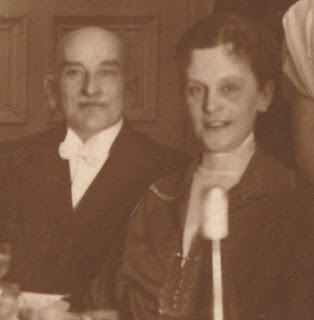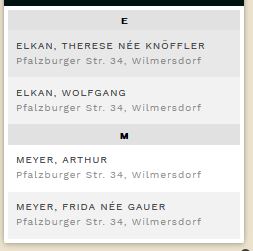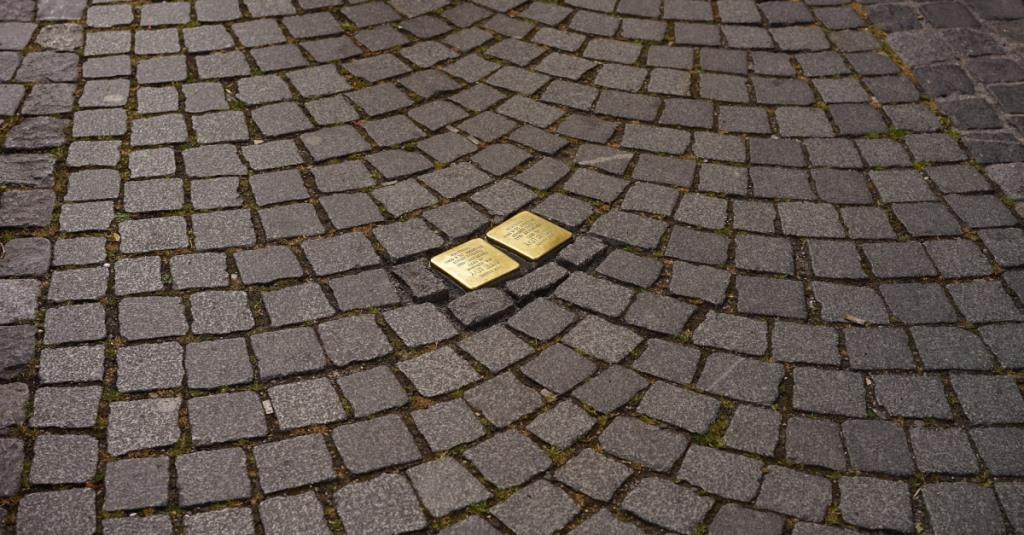During his court-martial, Josef told the court that he had direct Jewish ancestors. This was quite a revelation, as he had earlier told military interrogators that he was not Jewish. His court martial testimony, that his own grandfather was Jewish, seems like a desperate bid to gain the sympathy of the court. My own genealogical research has definitively shown that Josef’s ancestry, on both sides, is Catholic well back into the 1500s.
At various points during his interrogations and court martial testimony, Josef also mentioned that his “father-in-law” was Jewish. In actual fact, it was Josef’s step-father-in-law who was Jewish, a man named Abraham Wolfgang Elkan. When I published my book on Josef Jakobs, I told a bit of the tale of Elkan and, while I knew he had died before 1943, the year that his wife (Therese (née Knöffler) Elkan) passed away, I did not know the circumstances of his passing. Had he perished in a concentration camp?
What Josef did not mention during his interrogations, nor at his trial, was that his aunt-in-law, Johanna Knöffler, was living with a Jewish gentleman as well. While not married, the couple apparently lived as what we would now call common-law. While the name of this gentleman did not survive in our family lore, we do know that he was eventually taken to a concentration camp where he was murdered during the Shoah.
Sooo… two Jewish in-laws, the husbands/boyfriends of two sisters: Therese (née Knöffler) Elkan and Johanna Catharina Knöffler. With my discovery of the 1939 German Minority Census, I decided to try and uncover the stories of these two men. These are their stories.
Abraham Wolfgang Elkan
My great grandmother, Marie Therese Knöffler, was the daughter of hairdresser Albert Erwin Ludwig Knöffler and his wife Alma Adelheid Therese Jacob. The third of eight children, Therese was born on 25 August, 1876, in Berlin.
As a young woman, Therese had a succession of ill-fated encounters with men. On 12 April 1899, Therese married Adolf Hermann Georg Köhne, a hairdresser by trade. Their marriage was short lived, lasting less than two years, abruptly terminated by the death of Georg Köhne on 9 February, 1901 in Berlin.
While the exact circumstances are unclear, just over a year later, Therese gave birth to a daughter, Alma Margarete Knöffler, my grandmother. Given that Therese’s surname was Köhne, it is rather odd to see the daughter given the surname Knöffler. Although, given that Georg had died more than 12 months prior to Margarete’s birth… one can surmise that the child did not receive the Köhne surname because she was illegitimate. Later in life, under the Nazi regime, Margarete was required to provide a paternal ancestry to the authorities. From family documents, it would appear that her father was one Johannes (Hans) Fitzner who emigrated to Mexico.
From the birth of Margarete until 1919, Therese seems to have lived as a single mother, although, given how hard it is to track women in the genealogical records, she could well have had other encounters with men, but none that appear in the records.

(Copyright 2020 – G.K.Jakobs – from Jakobs family archives)
On 6 March 1919, however, Maria Therese (née Knöffler) Köhne married Jewish businessman Abraham Wolfgang Elkan in Wilmersdorf, Berlin.
Born on 20 September 1869 in Berlin, Wolfgang was the son of Isaac Isidor Elkan and Ernestine Wolfgramm. From what I can gather, Wolfgang had an older brother, William Elkan born in 1864 but I have been unable to find any other children.
Wolfgang’s occupations are variously given as “Agent” or “Restaurateur”, suggesting that he owned a restaurant. Beyond that, I don’t know much about the man. The one photograph we have of him was taken at Josef and Margarete’s wedding in 1927.
After the wedding, Josef and Margarete moved in with Josef’s parents at Pfalzburger Straße 13 but, within a few months, moved to live with Therese and Wolfgang in their flat at Pfalzburger Straße 34.
Josef and Margarete would remain there until early October 1938 when they moved themselves and their three young children to Rudolstädter Straße 124. Given the increasing persecution of the Jews, and the fact that a mixed marriage, like that of Therese and Wolfgang, was a target of the Nazis, one wonders if that played a role in the departure of Josef and his family.
In the winter of 1938, Hitler classified existing mixed marriages (a marriage between a Jew and a non-Jew that existed before the 1935 Nazi decree forbidding mixed marriages) as either “privileged” or “non-privileged”. A privileged marriage was either one in which the wife was Jewish or a marriage in which the husband was Jewish and their children had not had a Jewish upbringing. A non-privileged marriage was either one in which the husband was Jewish and there were no children or one in which the non-Jewish wife had converted or if the children had been brought up in the Jewish faith. Under these criteria, the marriage of Wolfgang (Jewish) and Therese (non-Jewish) would have been a non-privileged marriage (husband was Jewish and there were no children).
For those with a privileged marriage, the family was allowed to stay where they had been living, for the time being, and their family property could be transferred to the non-Jewish partner or to the children. In a non-privileged marriage, however, the married couple lost not only the right to reside in non-Jewish districts and power over the family property, but were treated like Jews who were emigrating (i.e. they lost both their citizenship and their property).
The Nazis exerted considerable pressure on non-Jewish spouses to divorce their Jewish partners and this external pressure often resulted in the breakdown of many marriages. The protections afforded to the Jewish partner by being married to a non-Jewish partner ceased if the couple divorced or if the non-Jewish partner died. The protection was very ephemeral and the stress under which these couples lived must have been incredible. And yet, the Nazis were sometimes quite tentative in pursuing couples of mixed marriages, in part because the non-Jewish partners, and other relatives often protested such treatment.
This then, was the situation for Wolfgang and Therese in the late 1930s. As a non-privileged mixed marriage, Therese offered some protection to Wolfgang, but for those who had the eyes to see, the writing was on the wall. Josef said that it was through Wolfgang that he came to know many Jewish Berliners, many of whom wanted to escape the Nazis. Even Wolfgang, according to Josef, had sought to negotiate for Yugoslavian papers in order to escape Nazi Germany.

In the 1939 German Minority Census, Therese and Wolfgang were still living at Pfalzburger Straße 34, a tenement building. That same year, another Nazi order decreed that all Jewish men needed to add Israel to their name so that their racial background was obvious. Four years later, when Therese passed away on 10 February, 1943, she was still living at that address. What then, became of Wolfgang?
Last year, I came across the 1919 marriage registration of Wolfgang and Therese. The Berlin marriage registrations available on Ancestry are closed for 100 years, so it only required patience to wait until they were released online. A marginal note on the registration states that Wolfgang Elkan passed away on 4 October 1941 in Berlin-Wedding.
I ordered a copy of Wolfgang’s death registration late last year and learned that he passed away of a heart attack at the Krankenhause der jüdischen Gemeinde (Jewish community hospital) in Berlin-Wedding. This was quite a distance from the couple’s residence at Pfalzburger Straße 34 in Berlin-Wilmersdorf and one could wonder if the long journey, and the delay in receiving treatment, contributed to Wolfgang’s passing. As a Jew, Nazi decree forbade him from receiving treatment at a local, non-Jewish hospital. On the other hand, he was 72 years old and his death from natural causes (presumably) saved him from a far worse fate at the hands of the Nazis. Wolfgang’s final resting place is unknown.
This then, is the story of Therese Marie Knöffler and her Jewish husband. Therese’s youngest sibling, Johanna Catharina Knöffler would also embrace a Jewish man, but his fate would be very different.
Sources
Jewish Hospital Berlin – in Berlin-Wedding
Jakobs family archives
Ancestry – genealogical records
1939 German Minority Census via Mapping the Lives
